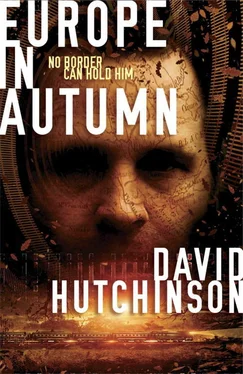The Coureur looked round the room and said, “Jesus Maria, Fabio.”
“Go,” said the synthesised voice. “Just go.”
The Coureur seemed to come to a decision. He grabbed the Kapitan and urged him over to the door. “You. I want this key he was talking about, and I want to know where these proofs are.”
“In my office.”
“Right. Let’s get them and get out of here.”
THEY STOPPED FOR a few moments in the Kapitan’s office, where he unlocked his safe and took out an envelope and handed it to the Coureur. The Coureur stowed it in a pocket of his suit and then they were out again, running down corridors full of people panicking at the Revisionist attack. The Kapitan shouted some orders, tried to calm things down as he passed, but it did no good. “He has a tank! ” someone shouted as they went by.
Instead of going down, they went up. Up endless flights of stairs, ascending into quieter and quieter parts of the building. At one point there was an almighty bang and the whole building seemed to shake dust off itself and the Kapitan found himself on his hands and knees, the Coureur dragging him back to his feet and urging him on through the stinking dusty corridors.
And then they were at the top of one final flight of stairs and the Coureur was throwing open a door onto a patch of late afternoon sky and they were on the colossal flat roof of the building.
“Seth!” the Coureur shouted over the sound of small-arms fire from far below on the Parade Ground, and a patch of air alongside a pile of boxes and metal bottles shimmered and became another stealth-suited figure.
They ran over to the figure, who pulled back its hood to reveal the anxious face of a young black man. “These people are not normal,” he said.
“Football fans,” said the Coureur. “Don’t know why they couldn’t just have got themselves lives.” He grabbed the Kapitan and planted him front and centre. “Get this piece of shit out of here.”
The second Coureur began buckling nylon straps all over the Kapitan. Then he snapped a harness to the straps. “What are you going to do?” he asked.
“I’ll meet you as arranged,” said the first Coureur. “I have to collect something first.”
“Right.” The second Coureur opened one of the boxes on the roof at his feet and snapped several lengths of line to his stealth suit. Then he stepped right up to the Kapitan and fastened their harnesses together so that they were face to face just inches apart. He grinned. “I understand you’re a right-wing racist bastard.”
The building shook again, and a wall of smoke billowed up from the side closest to the Parade Ground. “You two will have plenty of time to get to know each other,” said the first Coureur. “But we ought to get out of here.”
“Okey dokey,” said the second Coureur, and he pulled a cord and three of the boxes exploded as the balloons inside them suddenly inflated. He looked into the Kapitan’s eyes and beamed. “Run, you fucker,” he said quietly. And together, awkwardly, the big balloons above them tugging them up on their toes, they ran sideways towards the far edge of the roof as the first Coureur was still strapping himself into a harness.
At the very last moment a gust caught the balloons and swept them up into the sky, and for a few seconds, before their combined weight took over and began to drag the balloons in a slow arc that would eventually deposit them on the other side of the Landwehrkanal and safety, the Kapitan could see into the Parade Ground. Hundreds of people were fighting there. Hundreds more were lying on the ground, very still. And yes, Xavier did have a tank. Clever boy.
IT WAS THE same locker.
Rudi paused and looked at the number printed on the key given to him by Fabio’s nephew. Thirty-eight. He tried to remember the number of the locker he had looked into the last time he was at Zoo Station, and found that he could not. But it was the same one. He knew it was. There were no coincidences any longer; he was in the hands of what was, basically, a malicious God.
You cheeky bastard, Fabio…
He was also attracting attention, standing here like an idiot. He put the card into its slot and opened the door.
He half-expected to see Leo’s head, mummified and shrunken but still with that surprised expression on its face, but instead there was only Fabio’s burnbox, a calfskin-covered attaché case which would incinerate its contents at the first sign of unauthorised tampering. He grabbed the handle, pulled it out of the locker, swung the door closed, and limped out across the concourse.
At every step he expected to be shot, or stabbed, or mugged, or arrested. None of those things happened.
He left the station, went down the steps to the U-Bahn, got on a train to the Hauptbahnhof, and there boarded a train for Hannover.
Twenty hours later, he was sitting in an hotel on the Channel coast, a few miles from Dieppe. He was a thousand years older. Looking at himself in the flyblown mirror in his room, he thought it was a miracle that his hair hadn’t turned white.
THIS YEAR WHEN the season ended, Lev decided to kill himself.
He stood on the jetty and watched the last of the tourists being ferried back to their floating country and he put his hand in his pocket and felt the few drachmas and euros and dollars there and knew he couldn’t survive the winter. All of a sudden his legs felt watery. He sat down on a bollard and looked out over the bay and some of the younger fishermen laughed at him. The older ones, though, the ones who knew how quickly and completely a man’s life can fall apart, kept a grim and respectful silence.
The great white ship in the bay was simply called Nation . It was a country for tourists, a country of tourists, making a year-long tour of the Mediterranean and Aegean before wintering in dry-dock in Kiel. It was a nation of the aged and the wealthy from all over the world.
This year, the great vessel brought him Myrna, on a cruise to console herself over the death of her fifth husband. “Did it when Danny died as well,” she told him. “And George. And Charlie.” And she smiled, and Lev felt himself shrink inside. When she smiled, she reminded him of owls. Not the wise owls of legend, but the mouse-destroying birds of prey.
Myrna. Ripped and exercised to the point of mutation, barely an ounce of fat on her, like a woman made entirely of twigs and the tufts of hair left by sheep on barbed wire fences. No way to tell how old she was, but old. She had wined him and dined him and consented to let him pleasure her, but she had been unwilling to bestow any more lasting gifts upon him. Gifts, for instance, which he could sell to pay his rent.
Gods but it was hot, even though winter was howling its way along the Med. This place was no good for Russians. Too hot. Too alien. The food tasted wrong and the alcohol was terrible, although one was able to overlook that if one drank enough of it.
He had come here four years ago, island hopping until his funds ran out and he could no longer afford a ferry fare. In Greek, the island’s name meant something like ‘The Place Where We Forgot Where We Were,’ which seemed appropriate. Lev’s arrival had coincided with Nation dropping anchor in the bay and disgorging its population, including Penny. Penny from Pittsburgh, who had taken a shine to Lev to the extent that when she left he was able to sell all the things she had given him and rent a single filthy room over a taverna in the Old Town and survive, somehow, until the next boatload of tourists came in.
Nation ’s next visit had brought Alice. Then Corinne. Between times, Lev scratched a living teaching English and Russian and proofreading guidebooks, although the material return for that was tiny. He began to regard Nation with the fervour of an eighteenth century cargo cultist.
Читать дальше







